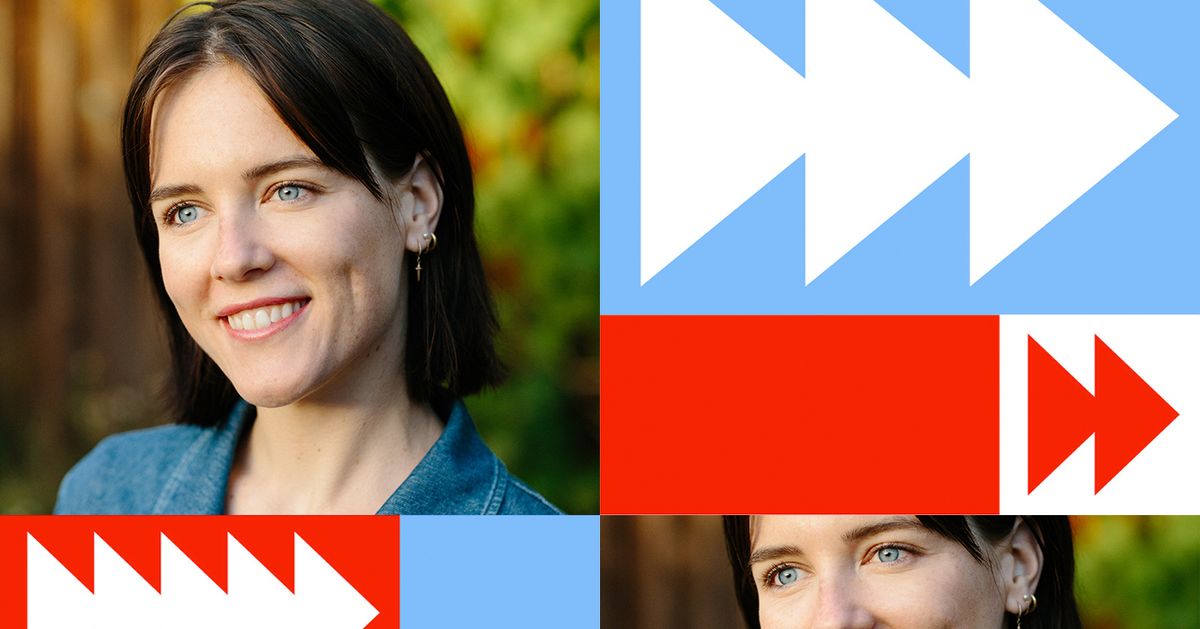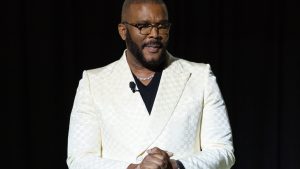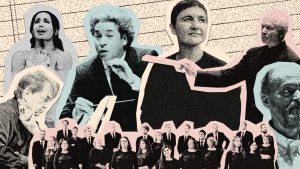
What Kyla Scanlon Is Listening To
By
Nicholas Quah,
a Vulture critic who covers podcasts, television, and pop culture
Photo-Illustration: Vulture; Photo: Stella Kalinina
At some point over the past year, Kyla Scanlon seemed to be everywhere — at least on my feeds. I first heard her on Bloomberg’s Odd Lots in the summer of 2024, tied to the release of her book In This Economy?: How Money & Markets Really Work, which is a kind of economics primer for the TikTok generation. Recently, she surfaced on The Ezra Klein Show, expanding on a Substack post about the political juice of both Zohran Mamdani and Donald Trump, a piece that had already ricocheted across my blogrolls and reading lists. Not long after, I spotted the more geriatric corners of my network sharing clips of her appearance on The Daily Show, the 28-year-old anointed as a type of economics spokesperson for her generation. But it turned out that even before I was familiar with her name, I knew her coinage: vibecession, the shorthand for a downturn defined less by data than by collective mood.
Scanlon’s platform has only kept growing. When we spoke, she had begun her West Coast day absurdly early with a 6 a.m. spot on MSNBC’s Morning Joe, where she spoke on a panel that also included Andrew Ross Sorkin. Busy days like this one are now routine. Between pumping out essays for her Substack and explainers for social media, where she has increasingly turned her focus to the economy’s attentional and speculative aspects, she is drafting her second book, developing a television project, and crisscrossing the country on a speaking tour. In This Economy? put her on the road in the first place, widening her audience. Paradoxically, all this activity has left her feeling as though she should be doing more.
Despite the rising profile, Scanlon is still settling into the role of professional “economics commentator,” a label now affixed to her with some permanence. She has only recently grown comfortable with it, even as she finds herself moderating conversations with central bankers like Mary Daly. A Kentucky native, she once pursued engineering for the sake of stability before realizing economics could be both a viable career and a vessel for curiosity. That background lends her work an unvarnished normalcy. She’s often cast as a “Gen-Z economist,” a tag she accepts more than resists, if only because it’s accurate. “I talk to a lot of young people when I’m on the road with the book,” she says. “They read the newsletter, they ask questions, and I try to grapple with them.” What she sees in the field, though, is a profession still reluctant to welcome outsiders: “A lot of times, I go to these economics conferences and people say, ‘Whoa, you’re young.’” But as I learned through our conversation, her vantage point isn’t just generational but unusually wide, expressed by media habits that range from listening to podcasts to reading classic books to having a newfound interest in proper cinema.
“My first pick would be Heavyweight. It’s a show where the host, Jonathan Goldstein, generally works with an ordinary person to resolve a big heavy moment or regret from their past. But he does it in this really incredible way: complete investigative journalism, tracking down the people involved and seeing if there’s a way to get closure.
There’s one episode that really stuck with me about a woman who had been bullied badly in middle school. Decades later, she was still not able to get past it. He ends up working with her to reach out to those classmates, and things don’t resolve quite as neatly (another thing I like about this show), but it ends up in this really beautiful, poignant place. Covering the subjects I do, I rely on a lot of podcasts for informational purposes, but I do like listening to these stories of ordinary people — This American Life, things like that. They are sometimes as informative as the ‘news podcasts.’ It’s so wonderfully produced, and I like spending time with the stories that are told.”
“Like a lot of people, I had a stage in my early 20s where I became interested in figuring out the meaning of life and things like that (though, to be fair, I’m going through that now as well). I didn’t really have much opportunity to do an engaged study when I was in college. I had worked three jobs in college and had three majors, and so I didn’t make a lot of time to read up on philosophy or big ideas outside of, like, John Maynard Keynes and Milton Friedman and the other usual stuff that you’d naturally find in an econ major. So during the pandemic, I found Philosophize This! and it totally changed my life. The host of the show, Stephen West, was a warehouse worker at one point who listened to a lot of philosophy audiobooks while on the job, and at some point he started turning all that he was ingesting into these beautifully constructed episodes that are so accessible in terms of helping me think through a lot of these texts and ideas.”
“The hosts, Michael Hobbes and Peter Shamshiri, tackle these airport books and big best sellers that really shape pop culture, and they do an incredible amount of research before breaking them down. The episodes usually involve finding the cracks in the book, assessing what doesn’t hold up or what’s based on faulty reasoning or where ideas go wrong. In a way, I guess I’m listening to it as an author, perhaps to get a sense of what not to do or possible issues with writing popular nonfiction, but sometimes they do make episodes where I’m like, Oh no, I really like that book.
There was one episode I remember about Men Are From Mars, Women Are From Venus, which was this book that ended up having a huge influence on gender dynamics during its time. The author was a womanizer-in-training who was rolling with this MTV star named Mystery. He was a total character. But it was really interesting to listen to the episode to get a sense of (1) how the book was so certain in theory but (2) completely wild in practice — and that’s so many things!”
Photo: Jonathan Hession/Universal Pictures/Everett Collection
“In the Name of the Father is so good. It’s set during the Troubles in Northern Ireland, and it’s about a man who’s pressured into taking the blame for a bombing and the pursuit of justice that follows from it. Incredible study of the legal system. Daniel Day-Lewis is fantastic in it. I’ve been going through his filmography lately: The Last of the Mohicans, There Will Be Blood. It’s so great that he’s coming back from retirement!
I’m relatively new to the movie world. It just wasn’t a big part of the culture in the household I grew up in; outside of Liam Neeson stuff, my parents weren’t really into movies. I grew up reading a lot of books, mostly. But I recently found my way into it, and so I’ve started making a syllabus for myself, partly using Roger Ebert’s The Great Movies, and I’m having fun working my way through it. Just saw Titanic and The Assassination of Jesse James by the Coward Robert Ford, Capote, etc., which are also pretty great.”
Photo: Jim Dyson/Getty Images
“Have you ever heard of Alabaster DePlume? He’s a little unconventional. He has these beautiful songs where he uses spoken word and creates these really beautiful melodies. I like ‘Whisky Story Time’ and ‘I Don’t Know,’ which I find very lyrical and very fun — they just don’t sound like anything I’ve heard. When I’m really stressed out, I find it helpful to throw his music on and just pay attention to the phrases he uses and messages he bakes into his songs.”
“This is one of my favorite books. It’s by Richard Bach, who’s written a lot of books about flight, as a former pilot, and it’s kind of a fable about this seagull who really wants to fly despite everybody telling him, like, “You’re not going to be able to. You’re lame and dumb.’ But he does learn, and he teaches everyone else to fly, and the book then becomes what it looks like to have a figure who is so inspirational pass away and what happens when you forget why you’re doing something. It’s a nice reminder of what it takes to sustain belief and keep a message going beyond the leader.”
What Kyla Scanlon Is Listening To











